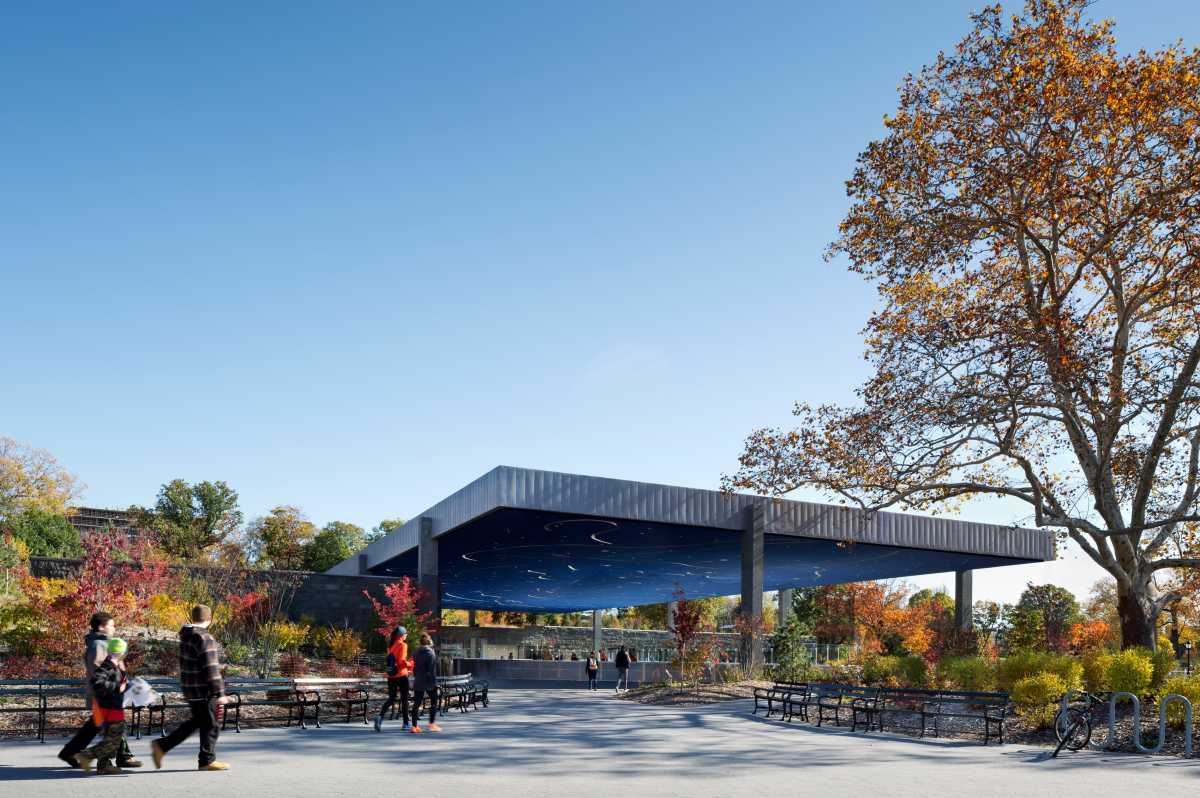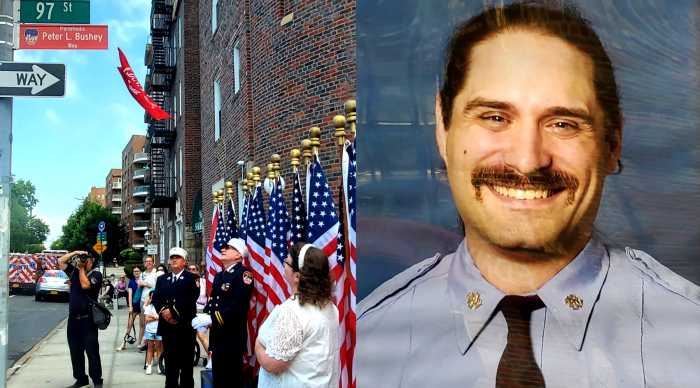By Lee Ann Westover
On a recent weekday night at The Jazz Standard in Gramercy, Grupo Los Santos gathered to celebrate the release of their new disc, “Lo Que Somos Lo Que Sea.” Amidst the pungent smell of barbeque from Blue Smoke above, the Latin-influenced quintet took the stage in front of assembled friends, fans and family to celebrate their first release in seven years.
Gruop Los Santos is Peter Smith on guitar, William “Beaver” Bausch on drums, Paul Carlon on Saxaphone, Dave Ambrosio on double bass and percussionist/dancer Max Pollack beating out what he terms “Rhumba Tap” on his body and a slab of microphoned wood on the floor. Just before the release of what was to be group’s second CD, their original bassist left the group to study music in Paris. Smith says of Ambrosio, who came in to replace him, “Dave took a while to gestate with us, but ironically it’s taken the music further.” Over the years of his tenure with the band, Ambrosio has become a first-class Batalero (a player of the Cuban batà drums). “He’s a Cuban Monster” according to Smith. This is a prime example of what has moved Grupo Los Santos since its inception, and is something all the members share: a passionate desire to absorb everything possible about Latin American music, and then to transform it with their own unique blend of tradition and exploration.
The band began its long formation back in 1992, when longtime friends Baush and Smith struck up a musical camaraderie with Calson at a NYC-area jazz club. Pollack was a friend of Calson’s, and would join them at regular salsa jams. After a while, the men scored a gig playing weekly together at El Taller, a Latin American cultural center uptown. It was here that the band found a name. Bernardo Palombo, El Taller’s director at the time, dubbed them “Los Santos” (“the saints”) because they showed up week after week to play for the love of music — their only compensation being the money they collected in the bucket at the end of the night.
Months into the El Taller residency the band met Juan Pablo Torres, the legendary trombonist, who, as Smith recounts, “is responsible for what is the quintessential Latin album of the 1970s, “Estrellas de Arieto,” an all-star tribute like what Ry Cooder was trying to do with Buena Vista Social Club.” After hearing Grupo Los Santos, Torres invited them to become his backing band at his weekly gig at a diner in New Jersey. For two years, the group played twice a week, soaking up whatever they could from Torres, then mixing it into their own jazz and rock experiences at El Taller. It was with Torres that they had their first major break. In 1999, Grupo Los Santos performed with him at the Cuban All-Stars concert at Town Hall in NYC, which included other luminaries such as flautist Jose Frado and trumpet master Alfredo Valdez Jr. To follow it up, Grupo Los Santos traveled to Cuba to perform with Torres in 2001.
For all their dedication to learning the nuts and bolts of Latin American music, Smith is careful to point out that “We’re four gringos. We are not trying to play Cuban or Brazilian music as well as the Cubans or Brazilians, but to pay respect to it and interpret it from our own backgrounds…to learn from it, play it our way, and create something new with it.” They describe themselves as an “acoustic jazz quartet that plays roots-oriented, mostly original, Latin music.”
Grupo Los Santos’ chemistry is palpable, and their laid-back sense of humor is as evident as their chops. At the concert, the audience was encouraged to sing “Dude you’re so Neurotic“ during the chorus of the Santos original, “Happified.” As the band launched into the first song, “Toreja Kulo”, the title elicited a few giggles from the audience. In a mock reprimand, Bausch clarified: “It’s spelled with a ‘K!’ ” To the Spanish-speaker, the title is a play on the words for bull, ear and butt.
As the laughter died down, Pollack led us into the first tune of the set with the beat of his hands and feet, and the strange, primitive dance that comes out of such movement. After a few peaceful moments, as the rest of the band gently filled out the rhythm, the tune hit a higher gear. Smith threw himself entirely under the wheels of the music, at times gyrating and contorting as though possessed. “Toreja Kulo” eventually built to a frenzy of instrumental and organic sounds that set a reverent, yet celebratory tone for the evening that followed. The Santos shined during the set, as each one balanced the intense difficulty of what he was playing with the obvious joy the group gets through making music together.
Oddly, their originality has brought its own set of difficulties. “Sometimes people try to pigeonhole us as a Latin jazz group, but we don’t have the trappings,” says Smith. “We have no production values, no effects on the guitar, no electric piano, no trumpet, no electric bass.” Smith himself switches from a traditional nine-string guitar to a Gibson hollow body, and Carlon’s saxophone is elegant and spare as a featured instrument. Pollack’s “Rhumba Tap” brings an intense new dimension to the tunes, which is neither entirely dance nor entirely percussion. Perhaps as an answer to the question, “Well what are you then?” Grupo Los Santos named their new release “Lo Che Somos Lo Que Sea” which Smith translates as “What we are is what will be,” though Smith is careful to point out that “lo que sea” can also mean, “Whatever, dude.”
“Lo Que Somos Lo Que Sea” is available at www.cdbaby.com or the iTunes Music Store. Find out about upcoming performances at www.grupolossantos.com






































